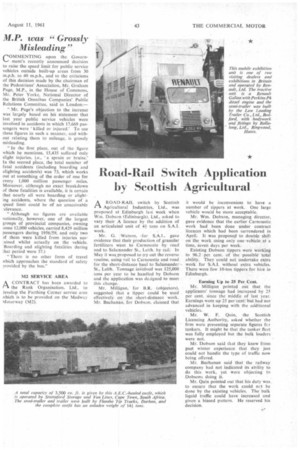Road-Rail Switch Application by Scottish Agricultural
Page 39

If you've noticed an error in this article please click here to report it so we can fix it.
I-1 A ROAD-RAIL switch by Scottish
Agricultural Industries, Ltd., was proposed at Edinburgh last week when Wm. Dobson (Edinburgh), Ltd., asked to vary their A licence by the addition of an articulated unit of 41 tons on S.A.I. work.
Mr. 0. Watson, -for S.A.E. gave evidence that their production of granular fertilizers went to Carnoustie by road and to Salamander St., Leith, by rail. In May it was proposed to try out the reverse routine, using rail to Carnoustie and road for the short-distance haul to Salamander St., Leith. Tonnage involved was 125,000 tons per year to be handled by Dobson and the application was deigned to meet this change.
Mr. Milligan, for B.R. (objectors). suggested that a tipper could be used effectively on the short-distance work. Mr. Buchanan. for Dobson, claimed that it would be inconvenient to have a number of tippers at work. One large vehicle would be more acceptable.
Mr. Wm. Dobson, managing director, gave evidence that the earlier Carnoustie work had been done under contract licences which had been surrendered in April. It was propose.d to double shift on the work using only one vehicle at a time, seven days per week.
Existing Dobson tippers were working to 96.2 per cent. of the possible total ability. They could not undertake extra work for S.A.I. without extra vehicles. There were few 10-ton tippers for hire in Edinburgh, Earning Up to 25 Per Cent.
Mr. Milligan pointed out that the applicants' tonnage had increased by 25 per cent. since the middle of last year. Earnings went up 25 per cent. but had not advanced in keeping with the aciditional vehicles.
Mr. W. F. Quin, the Scottish Licensing Authority, asked whether the firm were presenting separate figures fcr tankers. It might be that the tanker fleet was fully employed but the bulk loaders were not.
Mr. Dobson said that they knew from past winter experience that they just could not handle the type of traffic now being offered.
Mr. Buchanan said that the railway company had not indicated its ability to do this work, yet were objecting to Dobsons doing it.
Mr. Quin pointed out that his duty was, to ensure that the work could nct be done by the existing vehicles. The bulk liquid traffic could have increased and given a biased pattern. He reserved his decision.




















































































































